US House of Representatives Speaker Nancy Pelosi arrived in Taipei last night and was reportedly scheduled to meet with President Tsai Ing-wen (蔡英文), legislators and democracy advocates before departing later today.
The speaker departed from Kuala Lumpur yesterday afternoon and touched down at Taipei International Airport (Songshan airport) at about 10:43pm, where she was greeted by Minister of Foreign Affairs Joseph Wu (吳釗燮).
The stop marks the first time in 25 years that a sitting US House speaker is visiting Taiwan.
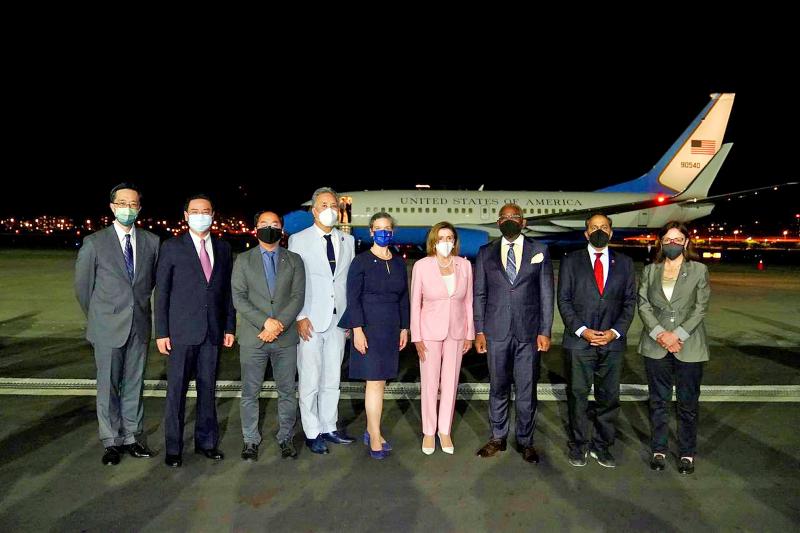
Photo: Lu Yi-hsuan, Taipei Times
Beijing has strongly condemned the visit, with Chinese Ministry of Foreign Affairs spokeswoman Hua Chunying (華春瑩) yesterday warning that the US “will bear the responsibility and pay the price for undermining China’s sovereign security interests.”
Her day is reportedly to start with an 8am meeting with Tsai.
An unnamed source cited by the Liberty Times (the Taipei Times’ sister newspaper) said that Pelosi would meet with lawmakers at a Legislative Yuan reception room at 9am, where she would give a televised public speech before holding a closed-door meeting with caucus conveners of the nation’s four main political parties.
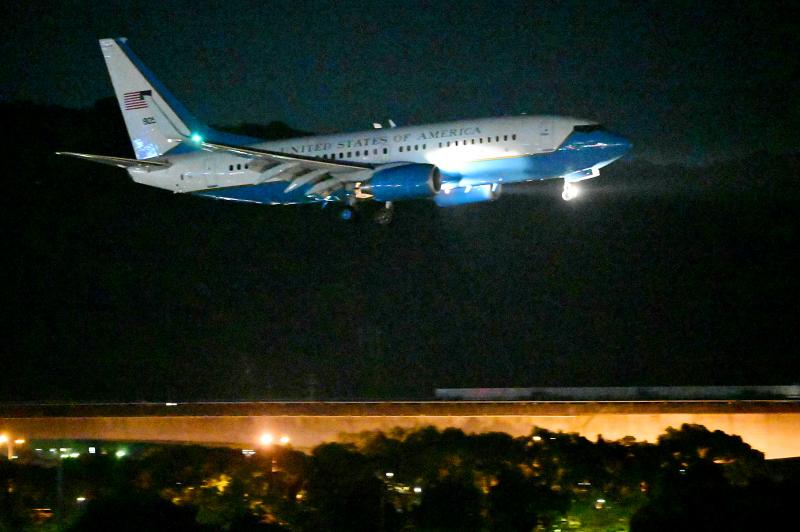
Photo: AFP
Democratic Progressive Party Legislator Lo Chih-cheng (羅致政), who heads the legislature’s Foreign Affairs and National Defense Committee, has also been invited, they said.
Whether Legislative Speaker You Si-kun (游錫堃) — who was in quarantine after testing positive for COVID-19 after returning from overseas — could join the meeting would depend on the result of a rapid test, the source said.
Pelosi’s stop at the legislature would take about an hour, they said, after which she would speak with Tsai again from 10am to 11am at the Presidential Office Building.
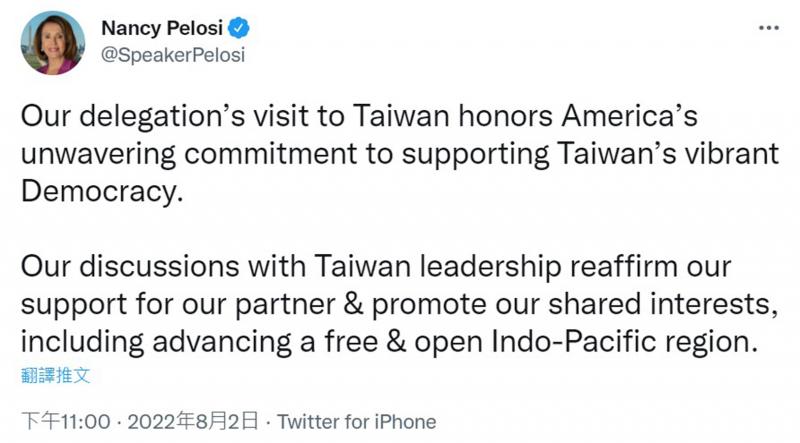
Photo: screengrab from Twitter
At 11am, a news conference was planned at the Taipei Guest House before lunch with Tsai at noon.
Pelosi in the afternoon at Jingmei Human Rights Park in New Taipei City would meet a small group of democracy advocates who are outspoken about China’s human rights record, the Liberty Times reported.
The American Institute in Taiwan has been in contact with Chinese and Hong Kong democracy advocates in Taiwan to arrange for a meeting with Pelosi, the paper said, citing another unnamed source.
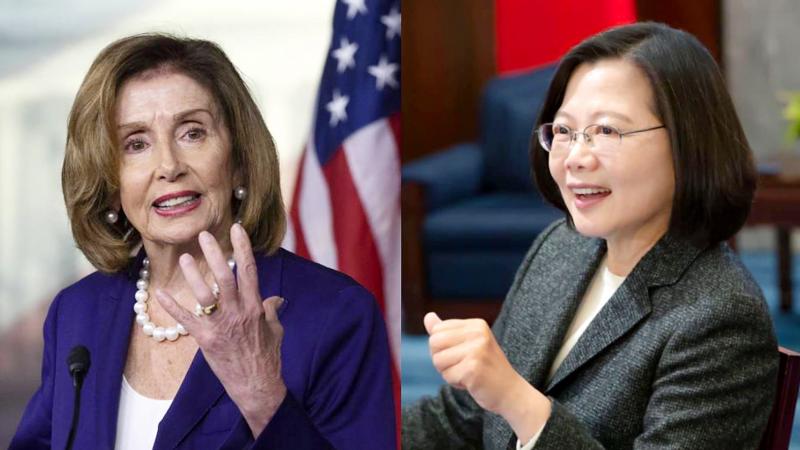
Photo: EPA and the Liberty Times
Lam Wing-kei (林榮基), former manager of Hong Kong’s Causeway Bay Books who was detained by Beijing in 2015, would attend the meeting, the source said, adding that Lee Ming-che (李明哲) — who spent five years in a Chinese prison before his release and return to Taiwan in April — and Wuer Kaixi — a Uighur student leader in the 1989 Tiananmen Square protests — were also contacted.
Lam said that he would visit Jingmei Human Rights Park today, adding that if he did meet Pelosi, he would suggest that the US government help young Hong Kongers leave the territory.
Pelosi is likely to leave Taiwan at about 5pm, sources said.
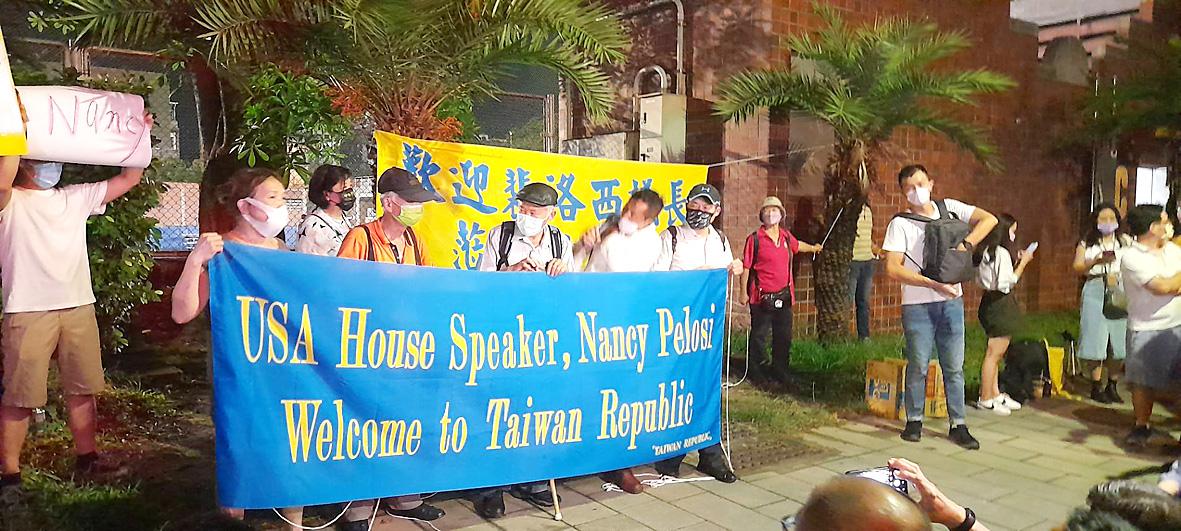
Photo: Jason Pan, Taipei Times
In a statement issued after her arrival, Pelosi said that her delegation’s visit "honors America’s unwavering commitment to supporting Taiwan’s vibrant Democracy."
"America’s solidarity with the 23 million people of Taiwan is more important today than ever, as the world faces a choice between autocracy and democracy," it said.
The statement also noted that hers is one of several congressional delegations to visit Taiwan "and it in no way contradicts longstanding United States policy" guided by the Taiwan Relations Act, the Three Joint Communiques and the "six assurances."
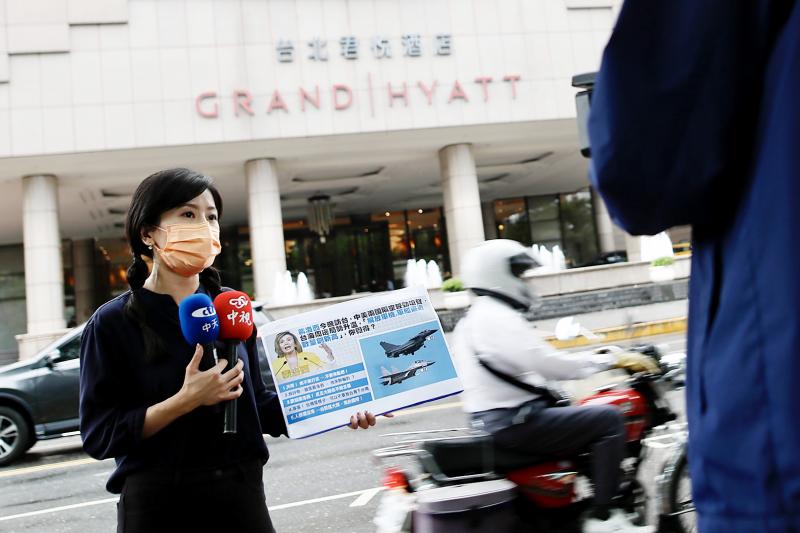
Photo: RITCHIE B. TONGO, EPA-EFE
In Washington on Monday, White House national security spokesman John Kirby said that nothing about Pelosi’s possible trip changed US policy toward Taiwan, and that Beijing was well aware that the division of powers within the US government meant Pelosi would make her own decisions about the visit.
“The speaker has the right to visit Taiwan,” Kirby told a White House briefing.
US Secretary of State Antony Blinken urged China to “act responsibly.”
“If the speaker does decide to visit, and China tries to create some kind of a crisis or otherwise escalate tensions, that would be entirely on Beijing,” Blinken told reporters at UN headquarters in New York prior to her arrival.
“We are looking for them, in the event she decides to visit, to act responsibly and not to engage in any escalation going forward,” he said.
Speaking to Fox News on Monday, former US House speaker Newt Gingrich, who was the last sitting speaker to visit Taiwan in 1997, said that the Chinese Communist Party was unlikely to act on its extreme threats.
“The worst case — if they shot down her airplane, that would be literally an act of war. And we would have no choice except to retaliate massively,” Gingrich said.
Gingrich said that the US and its Indo-Pacific allies such as Australia would not hesitate to strike back, and China would likely face retaliatory attacks and economic repercussions.
“So the Chinese are not necessarily in a strong position to try to bully us. And I think that we need to recognize that,” he said.
The US failing to stand up to “dictatorships” could inadvertently send the wrong message and cause Beijing to push the envelope by trying to occupy Taiwan, he added.
Additional reporting by Chen Yu-fu and agencies

Taiwan is gearing up to celebrate the New Year at events across the country, headlined by the annual countdown and Taipei 101 fireworks display at midnight. Many of the events are to be livesteamed online. See below for lineups and links: Taipei Taipei’s New Year’s Party 2026 is to begin at 7pm and run until 1am, with the theme “Sailing to the Future.” South Korean girl group KARA is headlining the concert at Taipei City Hall Plaza, with additional performances by Amber An (安心亞), Nick Chou (周湯豪), hip-hop trio Nine One One (玖壹壹), Bii (畢書盡), girl group Genblue (幻藍小熊) and more. The festivities are to

Auckland rang in 2026 with a downtown fireworks display launched from New Zealand’s tallest structure, Sky Tower, making it the first major city to greet the new year at a celebration dampened by rain, while crowds in Taipei braved the elements to watch Taipei 101’s display. South Pacific countries are the first to bid farewell to 2025. Clocks struck midnight in Auckland, with a population of 1.7 million, 18 hours before the famous ball was to drop in New York’s Times Square. The five-minute display involved 3,500 fireworks launched from the 240m Sky Tower. Smaller community events were canceled across New Zealand’s

The Ministry of Foreign Affairs (MOFA) yesterday said it is closely monitoring developments in Venezuela, and would continue to cooperate with democratic allies and work together for regional and global security, stability, and prosperity. The remarks came after the US on Saturday launched a series of airstrikes in Venezuela and kidnapped Venezuelan President Nicolas Maduro, who was later flown to New York along with his wife. The pair face US charges related to drug trafficking and alleged cooperation with gangs designated as terrorist organizations. Maduro has denied the allegations. The ministry said that it is closely monitoring the political and economic situation

‘SLICING METHOD’: In the event of a blockade, the China Coast Guard would intercept Taiwanese ships while its navy would seek to deter foreign intervention China’s military drills around Taiwan this week signaled potential strategies to cut the nation off from energy supplies and foreign military assistance, a US think tank report said. The Chinese People’s Liberation Army (PLA) conducted what it called “Justice Mission 2025” exercises from Monday to Tuesday in five maritime zones and airspace around Taiwan, calling them a warning to “Taiwanese independence” forces. In a report released on Wednesday, the Institute for the Study of War said the exercises effectively simulated blocking shipping routes to major port cities, including Kaohsiung, Keelung and Hualien. Taiwan would be highly vulnerable under such a blockade, because it